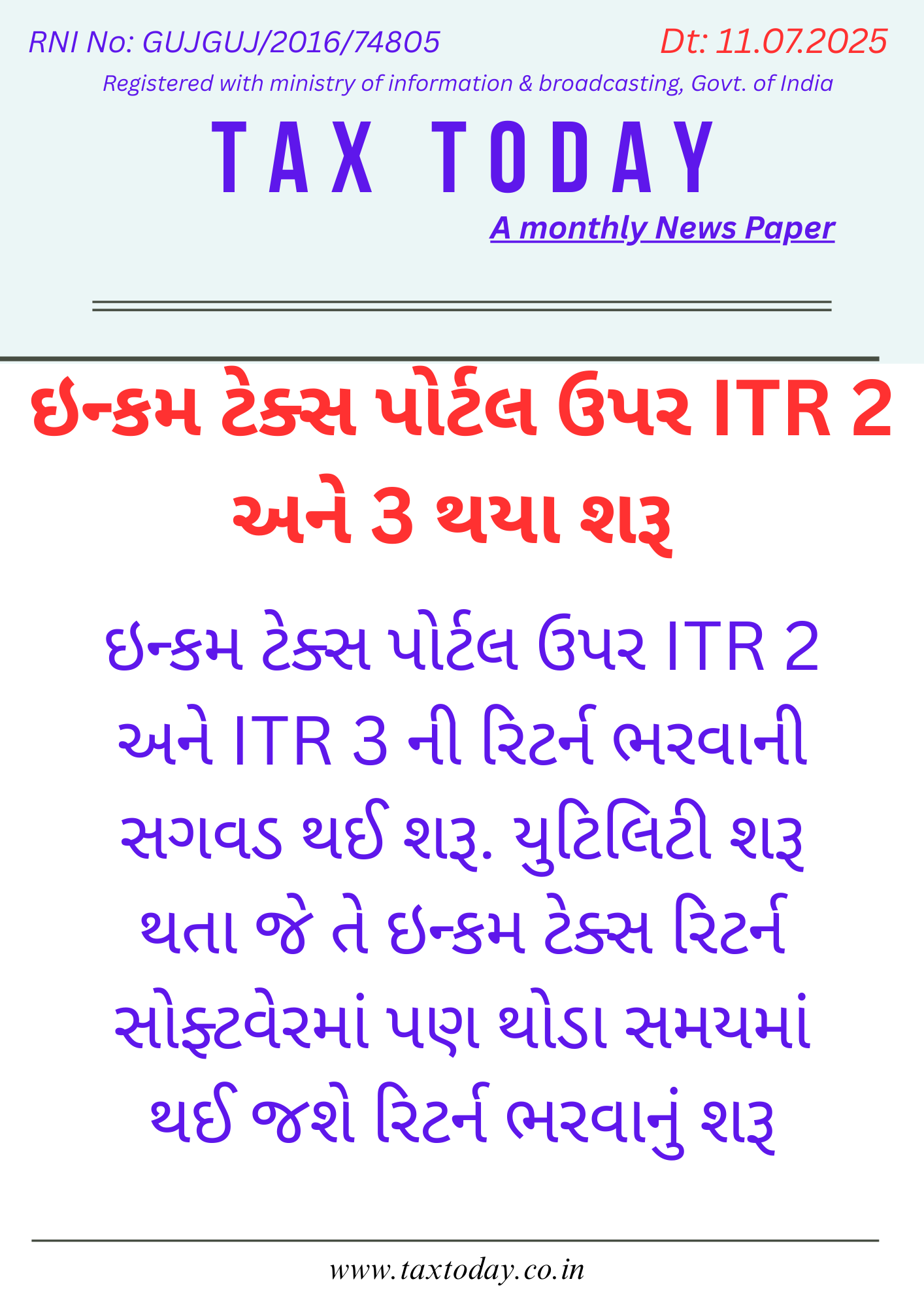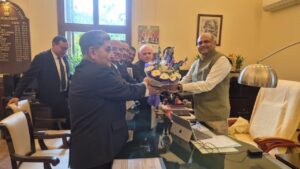GST WEEKLY UPDATE : 31/2022-23 (30.10.2022)

-By CA Vipul Khandhar
- GST Portal Issues Advisory on TRAN-1 for Taxpayers from Daman and Diu & Ladakh:
The portal clarified that, “Due to reorganization of the state of Jammu & Kashmir and merger of the Union territories of Dadra and Nagar Haveli and Daman and Diu, the taxpayers of Ladakh and earlier ‘Daman and Diu’ region have been allotted new GSTINs.
The aggrieved taxpayers of both the above-mentioned regions are hereby informed that they can file or revise their TRAN-1 or TRAN-2 Forms only through their newly allotted GSTINs. Kindly do not use the old GSTIN for filing of TRAN forms. “The respective tax administrations of both regions are also advised to accordingly facilitate the taxpayers and keep the above information in mind while processing the TRAN claims under the new GSTINs by linking both the old and revised TRAN-1 forms filed by such taxpayers,” the Portal said.
- CBIC: Payment of appeal pre-deposit in cash only for the cases pertaining to Central Excise and Service Tax:
- The CBIC vide CBIC-240137/14/2022-SERVICE TAX SECTION-CBEC dated October 28, 2022 has issued Instructions on the pre-deposit payment method for cases pertaining to Central Excise and Service Tax.
- The matter has been examined. It may be seen that Form GST DRC -03 is prescribed for payment of tax, interest, penalty under sub-sections (5) and (8) of both sections 73 and 74, and section 129 (1) of the CGST Act, 2017 or any other payment due in accordance with the provisions of the CGST Act, 2017 as specified in rule 142 (2) and 142 (3) of the CGST Rules, 2017.
- Further, in GST regime, in connection with the appeal mechanism under section 107 of the CGST Act, 2017, Rule 108 (1) of the CGST Rules, 2017 provides Form GST APL-01 for filing an appeal with the option of payment of admitted amount and pre-deposit through electronic cash/credit ledger. Thus, under GST Act also, Form GST DRC-03 is not a prescribed mode for payment of pre-deposit.
- Attention is invited to Miscellaneous transitional provisions sub-section (6)(b), sub section (7)(a) and sub-section (8)(a) of section 142 of the CGST Act, 2017, which, inter alia, provides that any credit, tax, interest, fine or penalty recoverable from the person before, on or after July 01, 2017 under the existing law (Central Excise Act and Chapter-V of Finance Act. 1994) shall be recovered as an arrear of tax under CGST Act. It is, however, settled that pre deposit as a requirement for exercising the right to appeal neither is in the nature of duty nor can be treated as arrears under the existing law and hence cannot be said to be covered under transitional provisions of CGST Act.
- In view of above, it is clarified that payments through DRC-03 under CGST regime is not a valid mode of payment for making pre-deposits under section 35F of the Central Excise Act, 1944 and Section 83 of Finance Act, 1994 read with section 35F of the CEA. There exists a dedicated CBIC-GST Integrated portal, https://cbic-gst.gov.in (Board’s Circular No. 1070/3/2019-CX dated June 24, 2019 refers in this regard), which should only be utilized for making pre- deposits under the Central Excise Act, 1944 and the Finance Act, 1994.
- Trans-1 & Trans-2 & Trans-3 has been started on portal: Following clarification has to be kept in mind while filling:
- The facility for filing or revising TRAN-1/TRAN-2 on Goods and Services Tax (GST) common portal will be available from 1 October 2022 to 30 November 2022 and the same would be a one-time opportunity.
- Transitional credit shall not be claimed in respect of forms (C-Forms etc.) issued after the due date of filing the original TRAN-1 i.e., 27 December 2017.
- Applicant shall submit to jurisdictional tax officer copy of TRAN-1/TRAN-2 along with declaration in “Annexure A” to the Circular and copy of TRANS-3, if applicable, within 7 days of filing.
- In case adjudication or appeal proceedings are pending, or proper officer has rejected the claim of credit partially or wholly, filing of a fresh declaration in TRAN-1/TRAN-2 would not be the appropriate course of action.
- Proper officer shall verify the TRAN-1/TRAN-2 filed by the taxpayer and pass an order after giving an opportunity of being heard. Post issuance of order, the amount shall be credited in the Electronic Credit Ledger.
- Last date of ITC availment, Invoice correction on or before 31st October-2022.
- Claiming of ITC in respect of any invoice or debit note in the return & books of accounts & gstr-1 return of the October month.
- Declaration of the details of credit notes in the return & books of accounts.
- Rectification of particulars in details of outward supplies for the period 1st april-2021 to 31st October-2022.
- Rectification of particulars furnished in a return for the period 1st april-2021 to 31st October-2022.
- It is further clarified that the said compliances in respect of a financial year can be carried out in the relevant return or the statement filed/ furnished upto November 30 of the next financial year, or the date of furnishing annual return for the said financial year, which ever is earlier.
- AAR & Judicial Decisions:
(i) Gujarat High court Decision Regarding Date of Filing Refund Application on GST Portal shall be Treated as ‘Date of Filing’:
(Applicant – M/s Chromotolab)
In a significant ruling, a division bench of the Gujarat High Court has held that the date of filing of the application as reflected on GST portal would be liable to be treated as date of filing claim for refund to the satisfaction of the requirement of Section 54 of the Central GST Act and Rule 89 of the Central GST Rules. The petitioner, Applicant was aggrieved by the rejection of refund application by the department as the refund claim was considered as time barred stating that the application was liable to be treated to have been filed on 17.10.2019 (the date of submission of physical documents) and not on 28.12.2018 (the date of submission of application online and ARN generated).
The department further relied on Circular dated 15.11.2017 wherein it was stated that the refund application is is required to be filed in FORM GST RFD-01A (as notified in the CGST Rules vide notification No. 55/2017 – Central Tax dated 15.11.2017) by the supplier on the common portal and a print out of the said form shall be submitted before the jurisdictional proper officer along with all necessary documentary evidences as applicable within the time stipulated for filing of such refund under the CGST Act.
Highcourt has observed that: observed that “the date of filing of the application by the petitioner on common portal would be liable to be treated as date of filing claim for refund to the satisfaction of requirement of Section 54 of the CGST Act and Rule 89 of the CGST Rules. The procedure evolved in Circular dated 15.11.2017 cannot operate as delimiting condition on the applicability of statutory provisions.”
(ii) AAR On Cotton Seed is not Agricultural Produce under GST Act:
(Applicant – M/S Kaka Ram Hari Chand vs. Punjab)
The Punjab Authority for Advance Ruling (AAR) Goods And Service Tax, has recently clarified that cotton seed is not an agricultural produce under the GST Act. The aforesaid observation was made by the Authority when an application was preferred before it by an applicant engaged in the business of receiving cotton seeds ‘Banaula’ after being transported by Goods Transport Agencies (GTA) which is classifiable with Chapter Heading 9965/9967 of the GST Tariff Act, 2017 and Goods and Services Tax. The question involved in the application seeking the advance ruling being as to whether there is no liability to pay tax in view of the exemption granted vide notification no. 12/2017, dated 28th June, 2017 issued under section 11 (1) of the CGST Act, 2017 which excepts the tax on GTA services in relation to ‘agricultural produce’, vide entry no. 21(a) in the table appended to the same, read with the definition of the term ‘agricultural produce’ given vide para 2 of the said notification,
The Authority observed as follows : “The definition of agricultural produce under the GST law is very restrictive in nature, for it provides exception only to those produces which are directly harvested from the farms or on which such processing is done by the cultivator to make it marketable which does not change its basic characteristics.” Thus, drawing its conclusion the Authority opinioned: “In the case of cotton seed, the same is obtained by way of an industrial processing called ginning, and hence it is debarred from the definition of agricultural produce as per the notification no. 12/2017- Central Tax (Rates), dated 28.06. 2017”.
Disclaimer:
This publication contains information for general guidance only. It is not intended to address the circumstances of any particular individual or entity. Although the best of endeavour has been made to provide the provisions in a simpler and accurate form, there is no substitute to detailed research with regard to the specific situation of a particular individual or entity. We do not accept any responsibility for loss incurred by any person for acting or refraining to act as a result of any matter in this publication.
(Author is a well known Chartered Accountant practicing in Direct and Indirect Taxes at Ahmedabad)





